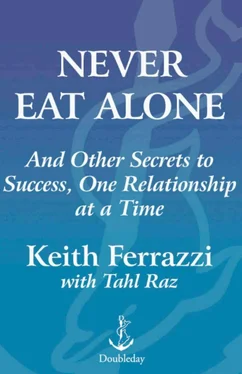Keith Ferrazzi - Never Eat Alone
Здесь есть возможность читать онлайн «Keith Ferrazzi - Never Eat Alone» весь текст электронной книги совершенно бесплатно (целиком полную версию без сокращений). В некоторых случаях можно слушать аудио, скачать через торрент в формате fb2 и присутствует краткое содержание. Год выпуска: 2005, ISBN: 2005, Издательство: C U R R E N C Y • D O U B L E D A Y, Жанр: marketing, на английском языке. Описание произведения, (предисловие) а так же отзывы посетителей доступны на портале библиотеки ЛибКат.
- Название:Never Eat Alone
- Автор:
- Издательство:C U R R E N C Y • D O U B L E D A Y
- Жанр:
- Год:2005
- ISBN:0-385-51529-4
- Рейтинг книги:4 / 5. Голосов: 1
-
Избранное:Добавить в избранное
- Отзывы:
-
Ваша оценка:
- 80
- 1
- 2
- 3
- 4
- 5
Never Eat Alone: краткое содержание, описание и аннотация
Предлагаем к чтению аннотацию, описание, краткое содержание или предисловие (зависит от того, что написал сам автор книги «Never Eat Alone»). Если вы не нашли необходимую информацию о книге — напишите в комментариях, мы постараемся отыскать её.
Never Eat Alone — читать онлайн бесплатно полную книгу (весь текст) целиком
Ниже представлен текст книги, разбитый по страницам. Система сохранения места последней прочитанной страницы, позволяет с удобством читать онлайн бесплатно книгу «Never Eat Alone», без необходимости каждый раз заново искать на чём Вы остановились. Поставьте закладку, и сможете в любой момент перейти на страницу, на которой закончили чтение.
Интервал:
Закладка:
While my career was in full throttle, in some ways it all seemed like a lucky accident. In fact, for many years, I couldn't see exactly where my professional trajectory would take me—after Deloitte, a crazy quilt of top-level jobs culminating in my founding my own company. It's only today, looking in the rearview mirror, that it makes enormous sense.
From Deloitte, I became the youngest chief marketing officer in the Fortune 500 at Starwood Hotel & Resorts. Then I went on to become CEO of a Knowledge Universe (Michael Milken)funded video game company, and now, founder of my own company, Ferrazzi Greenlight, a sales and marketing consulting and training firm to scores of the most prestigious brands, and an advisor to CEOs across the world. I zigged and zagged my way to the top. Every time I contemplated a move or needed advice, I turned to the circle of friends I had created around me.
At first I tried to draw attention away from my people skills for fear that they were somehow inferior to other more "respectable" business abilities. But as I got older, everyone from well-known CEOs and politicians to college kids and my own employees came to me asking for advice on how to do those things I had always loved doing. Crain's magazine listed me as one of the forty top business leaders under forty, and the World Economic Forum labeled me as a "Global Leader of Tomorrow." Senator Hillary Clinton asked me to use my connecting skills to raise money for her favorite nonprofit organization, Save America's Treasures. Friends and CEOs of Fortune 500 companies asked if I could help them throw more intimate dinner parties for their lead prospects and clients in key regions of the country. MBA students sent me e-mails hungry to learn the people skills their business schools weren't teaching them. Those turned into formal training courses now taught at the most prestigious MBA programs in America.
The underlying "softer" skills I used to arrive at my success, I learned, were something others could benefit from learning.
Of course, building a web of relationships isn't the only thing you need to be successful. But building a career, and a life, with the help and support of friends and family and associates has some incredible virtues.
1. It's never boring. Time-consuming, sometimes; demanding, perhaps. But dull, never. You're always learning about yourself, other people, business, and the world, and it feels great.
2. A relationship-driven career is good for the companies you work for because everyone benefits from your own growth— it's the value you bring that makes people want to connect with you. You feel satisfaction when both your peers and your organization share in your advancement.
3. Connecting—with the support, flexibility, and opportunities for self-development that come along with it—happens to make a great deal of sense in our new work world. The loyalty and security once offered by organizations can be provided by our own networks. Lifetime corporate employment is dead; we're all free agents now, managing our own careers across multiple jobs and companies. And because today's primary currency is information, a wide-reaching network is one of the surest ways to become and remain thought leaders of our respective fields.
Today, I have over 5,000 people on my Palm who will answer the phone when I call. They are there to offer expertise, jobs, help, encouragement, support, and yes, even care and love. The very successful people I know are, as a group, not especially talented, educated, or charming. But they all have a circle of trustworthy, talented, and inspirational people whom they can call upon.
All of this takes work. It involves a lot of sweat equity, just as it did for me back in the caddie yard. It means you have to think hard not only about yourself but about other people. Once you're committed to reaching out to others and asking for their help at being the best at whatever you do, you'll realize, as I have, what a powerful way of accomplishing your goals this can be. Just as important, it will lead to a much fuller, richer life, surrounded by an ever-growing, vibrant network of people you care for and who care for you.
This book outlines the secrets behind the success of so many accomplished people; they are secrets that are rarely recognized by business schools, career counselors, or therapists. By incorporating the ideas I discuss in this book, you too can become the center of a circle of relationships, one that will help you succeed throughout life. Of course, I'm a bit of a fanatic in my efforts to connect with others. I do the things I'm going to teach you with a certain degree of, well, exuberance. But by simply reaching out to others and recognizing that no one does it alone, I believe you'll see astounding results, quickly.
Everyone has the capacity to be a connector. After all, if a country kid from Pennsylvania can make it into the "club," so can you.
See you there.
2. Don't Keep Score
There is no such thing as a "self-made" man. We are made up of thousands of others. Everyone who has ever done a kind deed for us, or spoken one word of encouragement to us, has entered into the make-up of our character and of our thoughts, as well as our success.
— GEORGE BURTON ADAMSWhen I give talks to college and grad students, they always ask me, What are the secrets to success? What are the unspoken rules for making it big? Preferably, they'd like my response wrapped up in a tight package and tied with a neat little bow. Why not? I wanted the same thing at their age.
"So you want the inside scoop," I respond. "Fair enough. I'll sum up the key to success in one word: generosity."
Then I pause, watching the faces of the kids in the crowd as they look back at me with quizzical expressions. Half the group thinks I'm about to tell them a joke; the other half thinks they would have been better off getting a beer rather than attending my talk.
I go on to explain that when I was young, my father, a Pennsylvania steelworker, wanted more for me than he ever had. And he expressed this desire to a man whom up until that moment he had never met, the CEO of his company, Alex McKenna. Mr. McKenna liked my dad's moxie and helped me get a scholarship to one of the best private schools in the country, where he was a trustee.
Later, Elsie Hillman, chairwoman of the Pennsylvania Republican Party, whom I first met after she read in the New York Times about my unsuccessful bid for New Haven City Council in my sophomore year at Yale, lent me money and advice and encouraged me to attend business school.
By the time I was your age, I tell the students, I had been afforded one of the best educational opportunities in the world, almost purely through the generosity of others.
"But," I continue, "here's the hard part: You've got to be more than willing to accept generosity. Often, you've got to go out and ask for it."
Now I get that look of instant recognition. Almost everyone in the room has had to reach out for help to get a job interview, an internship, or some free advice. And most have been reluctant to ask. Until you become as willing to ask for help as you are to give it, however, you are only working half the equation.
That's what I mean by connecting. It's a constant process of giving and receiving—of asking for and offering help. By putting people in contact with one another, by giving your time and expertise and sharing them freely, the pie gets bigger for everyone.
This karma-tinged vision of how things work may sound naive to those who have grown cynical of the business world. But while the power of generosity is not yet fully appreciated, or applied, in the halls of corporate America, its value in the world of networks is proven.
For example, I enjoy giving career advice and counseling. It's almost a hobby. I've done this with hundreds of young people, and I get enormous satisfaction hearing from them later on as their careers progress. There are times when I can a make a big difference in a young person's life. I can open a door or place a call or set up an internship—one of those simple acts by which destinies are altered. But too often the offer is refused.
Читать дальшеИнтервал:
Закладка:
Похожие книги на «Never Eat Alone»
Представляем Вашему вниманию похожие книги на «Never Eat Alone» списком для выбора. Мы отобрали схожую по названию и смыслу литературу в надежде предоставить читателям больше вариантов отыскать новые, интересные, ещё непрочитанные произведения.
Обсуждение, отзывы о книге «Never Eat Alone» и просто собственные мнения читателей. Оставьте ваши комментарии, напишите, что Вы думаете о произведении, его смысле или главных героях. Укажите что конкретно понравилось, а что нет, и почему Вы так считаете.












